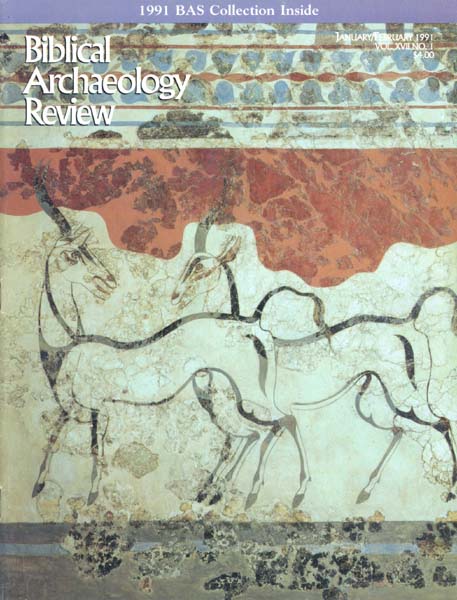Biblical Archaeology Review, January/February 1991

Features
John Strugnell, chief editor of the Dead Sea Scrolls, agreed to an interview provided I report it not only in the Hebrew paper for which I write, Ha-Aretz, but also in an English-language publication. The Hebrew article appeared in Ha-Aretz on November 9, 1990. The following article, for BAR, fulfills my obligation to report […]
Israel’s Antiquities Authority has turned down an offer by a major American philanthropic foundation to provide up to $100,000 to publish a book of photographs of the unpublished Dead Sea Scrolls. In a letter to the foundation, General Amir Drori, director of Israel’s Antiquities Authority, stated:
In the high stakes world of Dead Sea Scroll texts, things are not always what they seem. Take Professor James C. VanderKam’s offer to let anyone see the unpublished texts of Jubilees recently assigned to him for publication.
Photographs of all of the Dead Sea Scrolls, both published and unpublished, have been deposited for safekeeping with the Ancient Biblical Manuscript Center in Claremont, California. The Center is forbidden by contract, however, from allowing anyone to see these negatives except with the permission of the scroll editors. At a forum on October 27, 1990 at the Smithsonian Institution, James A. Sanders, President of the Ancient Biblical Manuscript Center addressed this situation:
Replace the deerstalker cap with a wide-brim hat; substitute a tee-shirt and shorts for the cloak; fill the air with dust and scorching sunlight instead of fog and damp darkness; and exchange the magnifying glass for a pick, a brush and a sieve.
Does a dig director look at an archaeological excavation differently than a volunteer? I have been both, so I am in an excellent position to answer the question. The answer is, well, yes and no. Last summer Avner Raban of the University of Haifa’s Center for Maritime Studies and I co-directed our first […]
BAR readers may well wonder what a small volcanic island—now a cluster of islands—in the Aegean Sea has to do with Biblical archaeology. The answer is threefold. Most important, this article is about a high civilization that was destroyed about 1500 B.C. (or 1628 B.C., according to a recent dating—see the sidebar “Thera and […]
Assyrian national history, as it has been preserved for us in inscriptions and pictures, consists almost solely of military campaigns and battles. It is as gory and bloodcurdling a history as we know. Assyria emerged as a territorial state in the 14th century B.C. Its territory covered approximately the northern part of modern Iraq. […]
